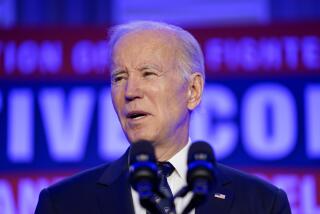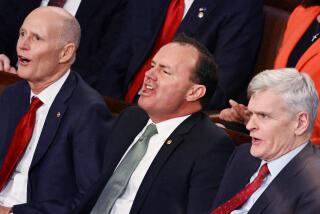Buying Into Medicare
- Share via
President Clinton has proposed the biggest potential expansion in Medicare since it began in 1965, a plan that could add hundreds of thousands of Americans to the rolls of a system that is rushing perilously toward insolvency. But, says the White House, the beauty of the new idea is that it would be wholly self-financed, paid for by those who chose to participate in it. If Clinton expects his proposal to get serious consideration, he’s going to have to come up with some hard and persuasive numbers to support that contention.
The social realities underlying the Medicare expansion plan are that forced or voluntary early retirements, along with the high cost of private health insurance, are leaving too many of the “near-elderly” without coverage. The Employee Benefit Research Institute in Washington estimates that about 3 million Americans between the ages of 55 and 64 are uninsured. Clinton seeks to provide this group access to health insurance in one of three ways.
* People between the ages of 62 and 65 could join the Medicare program by paying a fixed monthly premium estimated at $300. Once they reached the standard Medicare eligibility age of 65 they would pay a surcharge of $10 to $20 a month for every year they took advantage of the early buy-in option. Someone who chose to enroll in Medicare at 62, for example, would subsequently face a surcharge of from $30 to a cap of $50 a month.
* Laid-off workers as young as 55 who could not find new jobs would similarly be able to buy into Medicare, at an estimated premium cost of $400 a month.
* Finally, retired employees whose employers stop providing promised health benefits would be allowed to buy into their former employers’ health plans until they reached 65.
The White House guesses that only about 300,000 people would be able to afford the costs of any of the three options. This is, then, a modest and incremental approach to filling in a disturbing gap in health coverage, unlike the complex plan for virtually universal coverage that Clinton unsuccessfully backed in 1994. But even on those terms, strong doubts remain to be satisfied.
From its very beginning, Medicare’s costs have been notoriously underestimated. Expanded eligibility that could be shown to be self-financing might pass a skeptical Congress. A program that even hints at adding to Medicare’s costs is sure to be a nonstarter. The burden of proof is on the administration.
More to Read
Sign up for Essential California
The most important California stories and recommendations in your inbox every morning.
You may occasionally receive promotional content from the Los Angeles Times.










